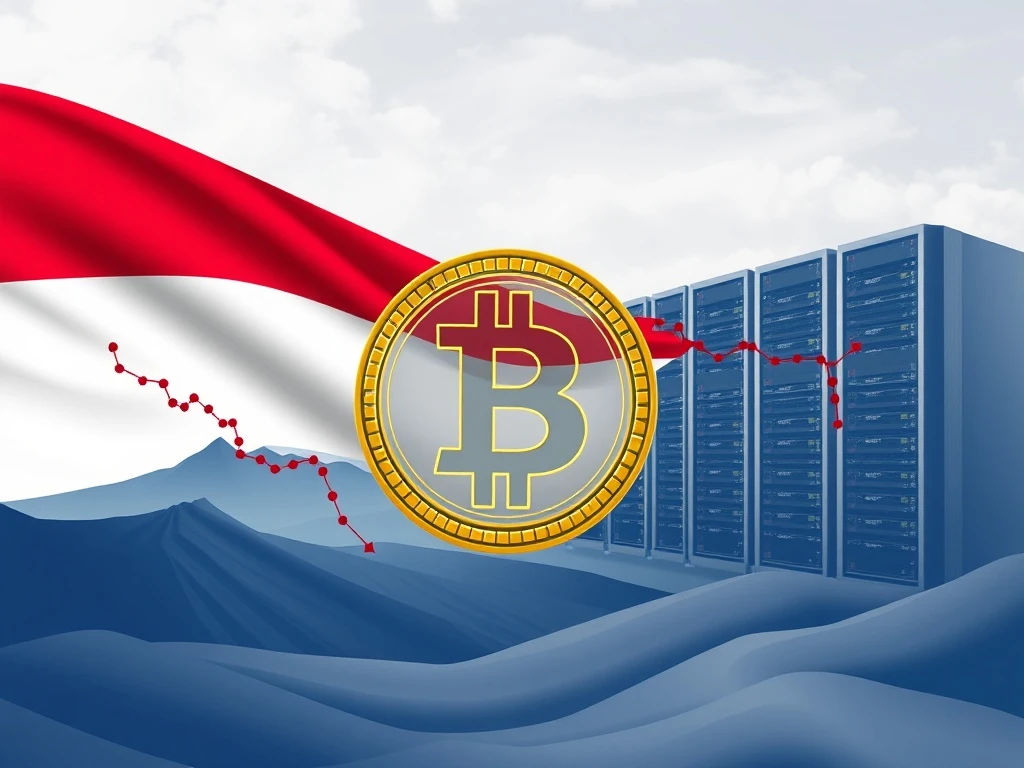Bitcoin: Indonesia Explores Bold National Reserve Strategy

The potential for Bitcoin to transform national economies continues to capture global attention. Recently, a significant development emerged from Southeast Asia: Indonesia Bitcoin discussions are underway regarding the implementation of a national Bitcoin reserve strategy. This bold move could position the archipelago nation at the forefront of digital asset integration, potentially reshaping its economic future.
Indonesia Explores a Bold National Bitcoin Reserve Strategy
Indonesia, the world’s fourth-most-populous country and the 16th largest economy with an estimated Gross Domestic Product (GDP) of $1.4 trillion, is reportedly exploring a groundbreaking economic strategy. Bitcoin Indonesia, a local community group, recently engaged with the Vice President’s office to present how Bitcoin could significantly benefit the nation. This high-level discussion focused on a pivotal concept: utilizing Bitcoin mining as a core component of a national reserve strategy.
According to Bitcoin Indonesia’s statement, officials invited the group to present the potential advantages of Bitcoin for the country’s long-term economic strength. This exploration signifies a serious consideration of Bitcoin’s role beyond just a speculative asset. The discussions also encompassed educational initiatives, recognizing the importance of widespread understanding for successful crypto adoption.
Leveraging Resources for Bitcoin Mining Opportunities
A key aspect of Indonesia’s potential Bitcoin reserve strategy involves leveraging its abundant natural resources. The presentation highlighted how the country could utilize its vast hydroelectric and geothermal energy sources to power Bitcoin mining operations. This approach offers multiple benefits:
- It provides a sustainable energy source for mining.
- It could spur job creation, mirroring successes in other nations embracing Bitcoin.
- It transforms underutilized natural assets into economic drivers.
Bitcoin Indonesia met with special staff from the office of Vice President Gibran Rakabuming Raka. During these meetings, the group presented forward-looking projections, including Michael Saylor’s prediction that Bitcoin could reach $13 million by 2045 in a base-case scenario, potentially soaring to $49 million in a bull-case. Such long-term growth prospects are undoubtedly appealing for a nation considering a strategic reserve asset.
The Role of Education in National Reserve Adoption
Beyond the technical and economic aspects, education emerged as a critical focus area. Bitcoin Indonesia emphasized the importance of comprehensive education initiatives to drive broader crypto adoption across the country. A representative from the Vice President’s office reportedly concurred, stating, “Indonesia must also continue to educate about Bitcoin in the future.”
This commitment to education is crucial for several reasons:
- It builds public understanding and trust in digital assets.
- It equips citizens with the knowledge to participate in the digital economy.
- It fosters a conducive environment for innovation and growth.
While the United States and other nations might consider Bitcoin as a strategic reserve to address worsening debt-to-GDP ratios or hedge against inflation, Indonesia’s situation differs. The nation maintains a relatively low debt-to-GDP ratio of 39%. Furthermore, its annual inflation rate, recorded at a low 0.76% as of January 2025, remains firmly under control. Therefore, Indonesia’s interest in a national reserve likely stems from a proactive pursuit of long-term economic strength and diversification, rather than immediate crisis management.
Navigating Current Crypto Policies and Enforcement
Despite these forward-looking discussions, Indonesia’s current regulatory landscape for cryptocurrencies presents a complex picture. The nation permits crypto trading, allowing its citizens to engage with digital assets on exchanges. However, it strictly prohibits the use of cryptocurrencies for payments within the country. This distinction is crucial for understanding the current operational environment.
Recently, Indonesia’s Finance Ministry implemented increased taxes on crypto traders and miners. For instance, income tax on crypto sales via local exchanges more than doubled, rising from 0.1% to 0.21%. Sales conducted on foreign exchanges saw an even sharper increase, jumping fivefold from 0.2% to 1%. Additionally, the value-added tax (VAT) on Bitcoin mining activities also doubled, moving from 1.1% to 2.2%. These tax adjustments reflect the government’s efforts to regulate and derive revenue from the burgeoning crypto sector.
The Reality of Crypto Payment Enforcement in Indonesia
Indonesia has maintained its ban on crypto payments since 2017. This policy was reaffirmed in 2023, with authorities stating that tourists found making crypto payments would be “dealt with firmly.” Yet, despite these official pronouncements, the enforcement of this ban appears to be less stringent in practice. A recent observation by a Crypto News Insights reporter on the ground in Bali revealed numerous real estate listings openly accepting Bitcoin as a form of payment.
This discrepancy between policy and practical enforcement highlights the challenges governments face in controlling decentralized technologies. As the discussions around a national reserve strategy progress, the government may need to reconcile its existing policies with its future aspirations for digital assets. The exploration of Bitcoin as a strategic asset suggests a growing recognition of its potential, even amidst existing regulatory frameworks.
The Broader Implications for Global Crypto Adoption
Indonesia’s proactive exploration of a Bitcoin reserve strategy aligns with a broader global trend. Discussions about ‘network states’ potentially competing with traditional ‘nation-states’ underscore the evolving landscape of global governance and finance. Furthermore, experts like Samson Mow have warned that the United States risks being ‘front run’ by other nations in adopting Bitcoin as a strategic reserve asset. Indonesia’s discussions could be a significant step in this global race.
The commitment to education and the consideration of sustainable energy for mining indicate a thoughtful approach. While the path forward involves navigating existing regulations and public perception, Indonesia’s interest signals a growing recognition among major economies of Bitcoin’s potential to fuel long-term economic strength and resilience. The outcome of these explorations could set a precedent for other developing nations looking to leverage digital assets for national development.








